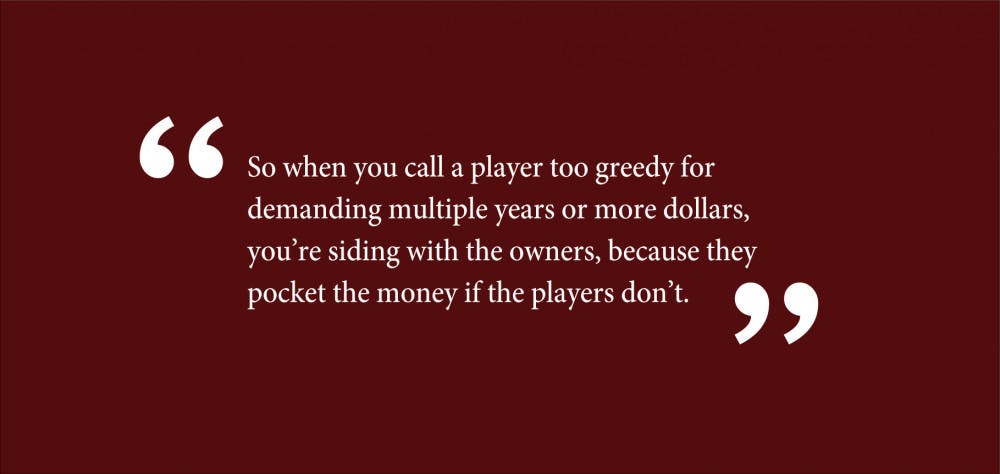So Manny Machado got a job. Great.
I really mean that — it’s a fantastic thing for baseball that Machado signed a ten-year, $300 million contract with the San Diego Padres. Along with Alex Bregman and Nolan Arenado, Machado is one of the top third basemen in the game. He has 175 home runs at the age of 26. His defense is almost supernatural. He has already been worth almost 34 Wins Above Replacement in six and a half seasons. And entering his prime, he just had the best offensive season of his career. Maybe he’s just getting started.
Yes, it’s a good thing for baseball that Machado is highly valued. It’s just a shame that we’re still waiting to say the same thing about Bryce Harper … and Craig Kimbrel … and Dallas Keúchel … and all the other major league free agents who are still unsigned. These are players who could make a dozen teams better in an instant, but owners are unwilling to pay for them.
Forget Bryce Harper for a moment. Let’s examine the problem as a whole. As Jeff Passan of ESPN reported last week, “A liberal accounting of the so-called XX(B) free agents — ones who have six-plus years of service — counts about 50. Of those 50, about half are clearly major-league-caliber players.” In other words, as of Feb. 15, 25 players good enough for major-league contracts do not have them.
Meanwhile, at Forbes, Maury Brown examined the comparative growth of baseball revenue and player salaries. His findings were simple: “The growth of league revenues increased at a faster pace than compensation back to the players grew.” MLB revenues have grown from about $6 billion in 2010 to $9 billion in 2017, but the percentage of revenue spent on player salary has shrunk from 51.1 percent to 50.1 percent. It might seem like a small decline, but in 2017, that one percent gap represented $90 million. And based on the data available for 2018, which shows a steep decrease from previous years, that 50.1 percent is likely to decline further.
Owners are spending a declining share of baseball revenue on player salaries and quality free agents are having more and more trouble finding jobs. Twenty-five major league caliber players remain unsigned, including a 25-year-old outfielder with an MVP award on his shelf and a pitcher on track to end his career as one of the best closers in baseball history. And baseball’s Collective Bargaining Agreement expires in two years. All together, a work stoppage seems more and more likely. The question is, which side has a problem? One side — either the players or the owners — needs to be content with a smaller share of MLB’s revenue. So which side is it?
Looking at specifics, it doesn’t seem like a particularly difficult question. Where should the money fans spend on baseball go? To the players! Baseball is baseball because of the players. Your favorite team’s owner could bring in a new owner tomorrow, and nothing would change. Or your team’s owner could swap out the entire roster for new players, and you might be angry enough to give up baseball forever.
The essential fact that fans need to grasp when confronting this question is that by and large, the choice between the players and the owners is binary. Sure, there’s some wiggle room — minor league players most certainly deserve a substantial pay raise, as do concessions workers, groundskeepers, ushers, etc. — but regardless, the vast majority of MLB revenue will go to either major league players or owners. So before complaining that $30 million a year is a ridiculous salary for someone who plays a game for a living, fans should ask themselves: If Manny Machado making $30 million a year is too much, would they rather that money go to the Padres owners? Ron Fowler and Peter Seidler, according to Forbes, bought the team in 2012 for $600 million. The Padres are now valued at $1.27 billion. Just by holding ownership stakes in the organization, never mind actually doing anything, the Padres owners have seen their combined net worth increase by more than $600 million.
Pick any team in baseball, and the results are the same. John Henry’s ownership group bought the Boston Red Sox in 2002 for $380 million — the team is now worth almost $3 billion. The Tampa Bay Rays, the least valuable team in baseball, generated $700 million in wealth for owner Stuart Sternberg after he bought the team in 2004. So when you call a player too greedy for demanding multiple years or more dollars, you’re siding with the owners, because they pocket the money if the players don’t.
Owning a baseball team comes with a certain amount of civic duty. Baseball is more than just a business — it’s almost like a public good, so owners have a responsibility to ensure that they put the best players on the field. Machado has been paid. Now pay Harper. And Kimbrel. And Keuchel. And all the other free agents who play good baseball but can’t find a team who will pay them.
Or don’t pay them. Keep bringing the players’ share of revenue down and make the players strike. But don’t expect fans to come to the ballpark to watch replacement players. The players make the game, and losing their support will damage owners’ revenue in ways that paying the players never could. It will be interesting to see what happens to the Padres’ revenue during a work stoppage, when instead of Manny Macahdo, Wil Myers and Eric Hosmer, the Padres’ biggest star is no-name replacement player Average Joe.
James Schapiro ’19 can be reached at james_schapiro@brown.edu. Please send responses to this opinion to letters@browndailyherald.com and op-eds to opinions@browndailyherald.com.





